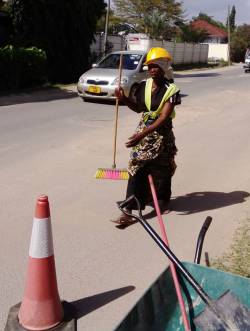 Every day, I come across bibis in Dar es Salaam; the grandmothers who brave the heat and rain, risking their lives and health to keep the city clean by sweeping the heavily congested streets.
Every day, I come across bibis in Dar es Salaam; the grandmothers who brave the heat and rain, risking their lives and health to keep the city clean by sweeping the heavily congested streets.
These bibis reflect the reality of poor older women here. Their numbers, origins, family status, working conditions, safety and security are largely unknown.
Most urban-based studies focus on young people and consequently, hide the diversity of the social groups who make up the city. However, you can easily see that these bibis represent the majority of poor older women; unable to secure decent employment because of their age and gender.
Older women experience a lifetime of poverty
There is no doubt that no one would take such high risk and strenuous job if they had family support and access to reliable source of income. On the contrary, these bibis could be among the 40% of older care givers to the 2 million orphans in Tanzania.
Thousands of older women like these bibis are the products of a cycle of poverty women and girls experience as they grow old. Girls who don’t have the right to inherit their father’s land, as they are expected to be married off at a young age, end up being widows with no right to own or inherit their husband’s land, despite years of hard work on the farm.
The same girls have fewer opportunities to go to school, are subjected to negative cultural practices such as female genital mutilation (FGM), experience gender-based violence and lack access to land, including in some clans the right to be buried.
Plight of African women farmers
A 2014 World Bank report “Levelling the Field: Improving Opportunities for Women Farmers in Africa”, highlighted the obstacles faced by Africa’s women farmers in feeding their families, increasing farm incomes and lifting themselves out of poverty.
This issue is particularly timely as the drafting of the constitution of Tanzania, which started a few years back, has reached a major milestone. The draft that was debated by a Constitutional Assembly was handed over to the head of state last week. It will be the supreme law of the land, once it has gone through a referendum.
One of the key achievements of this draft is the gender equality that underpins it. There is a great deal of jubilation among women’s rights activists, as the new draft constitution unlike its predecessor gives women the power to own and inherit land. The constitution also proposes a 50-50 representation in elected positions and endorses the marriage age for both boys and girls to be 18.
Increase in gender-based violence
Over the past years, Tanzania has made great strides in promoting gender equality. Reports indicate that more Tanzanian girls have enrolled in primary schools, while the number of women owning business enterprises, their representation in parliament and in wage employment has also risen.
However, Tanzania is also cited as one of the countries where gender-based violence is on the increase. In 2010, 33% of Tanzanian women reported they had been subjected to physical domestic violence (in the previous 12 months) compared to 25.1% in Kenya and 14.5% in Malawi.
The situation of older women is worse. Older women form the majority of victims of violence due to witchcraft accusations. The report by the Legal and Human Rights Centre, indicates of the 765 older people killed in 2013, 505 were older women. The findings of a study by the Commission for Human Rights and Good Governance further indicated that most killings are planned and carried out by younger family members to forcibly possess their parents’ and grandparents’ land, property and other assets.
Hope for women and girls
The progress proposed in the constitution is therefore a huge achievement, as it guarantees women and girls the right to equal access to land and property both of their own parents and their spouses. This change will hopefully consolidate Tanzania’s commitment to gender equality and result in a thriving economy, peace and security.
We hope women’s voice and visibility through their equal political participation breaks the cycle of poverty in which they are trapped. The bibis are often the silent and invisible victims of current and past gender inequalities and therefore their wellbeing, human rights and protection needs to be given due consideration.
Read more about older women’s rights in Tanzania.
